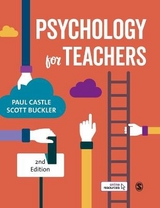
Psychology for Teachers
SAGE Publications Ltd (Verlag)
978-1-4462-1114-4 (ISBN)
- Titel erscheint in neuer Auflage
- Artikel merken
Every child is an individual whose knowledge and understanding needs to be developed in ways that help them succeed. How do you manage this alongside the realities of the curriculum? How do you achieve this for a full classroom of expectant learners?
Psychology for Teachers explains how psychology can be intelligently applied to the classroom to meet the needs of different learners. It encourages you to review your own practice to develop a personal teaching style, supported by research findings and an awareness of the factors underpinning high-quality teaching.
Focusing on how an understanding of psychological theory can support effective teaching and learning this book contains case studies and tasks to make sure that you really understand how theory can be meaningfully applied in the classroom.
Additional online materials
The book is supported by a companion website including resources such as free journal articles, additional activities and links to relevant information.
Scott Buckler is a Senior Lecturer and Paul Castle is a Chartered Psychologist, Health Care Professions Council-registered and Senior Lecturer. Both are based at the University of Worcester.
Scott Buckler has been involved in education since the 1990s, fluctuating between primary teaching, secondary teaching (science, computing, psychology), and universities (education, sport, psychology). From teaching research methods across the expanse of education (from the primary years through to doctorates), Scott has been an advocate of high quality research, through facilitating an open mind while maintaining academic integrity. His research has encompassed many areas, often with the theme of personal and professional growth, through the lens of transpersonal psychology. His PhD thesis was interdisciplinary, combining anthropology and psychology to explore the way that the martial arts lead to personal transformation. Professionally, Scott’s research is predominantly in applied educational psychology, inclusive education, and research methods. Scott is a Chartered Teacher and Chartered Psychologist. Paul Castle joined the University of Worcester as a senior lecturer in September 2004. He was a Chartered Sport and Exercise Psychologist, Associate Fellow of the British Psychological Society and registered with the Health & Care Professions Council. As an active practitioner, with over 20 years’ experience, Paul provided applied psychology consultancy to clients in a wide array of disciplines, with a particular emphasis on providing individual- and small-group support to teachers and lecturers, to ameliorate the effects of stress, depression and burnout. As Mental Health and Wellbeing (MHWB or MWB) Lead for the School of Sport & Exercise Science at Worcester, Paul embraced the emerging issue of MWB in students and staff within primary, secondary and tertiary education. He was an advocate for reducing the stigma associated with MWB and provided applied psychological support in guiding students through their own ‘personal challenges’ by a combination of sport, physical activity and psychological skills training. Paul was trained in Mental Health First Aid (MHFA) and Applied Suicide Intervention Skills Training (ASIST), in conjunction with his professional grounding. He was an active member of the ‘Suicide Safer’ Project Group at the University of Worcester, which aimed to promote ‘suicide safer communities’ both regionally and nationally.
PART ONE: PSYCHOLOGICAL PERSPECTIVES ON EDUCATION
Psychological perspectives on education: classical approaches
Psychological perspectives on education: developing approaches
The effective teacher
The philosophy and psychology of professional practice
PART TWO: THE INDIVIDUAL LEARNER
The individual learner: neurological and physical development of the learner
The individual learner: perceptual and cognitive development of the learner
The individual learner: social, emotional development and personality
PART THREE: MEETING THE NEEDS OF THE LEARNER
Meeting the needs of the learner: the self
Meeting the needs of the learner: enabling individual success
Meeting the needs of the learner: motivation
Meeting the needs of the learner: an integrated approach
PART FOUR: TEACHING: CLASSROOM PRACTICE
Empowering the learner: psychological skills development
The learning environment
The ′ideal′ teacher
Reflective position: integrating the strands of this book
| Erscheint lt. Verlag | 14.1.2014 |
|---|---|
| Verlagsort | London |
| Sprache | englisch |
| Maße | 186 x 232 mm |
| Gewicht | 840 g |
| Themenwelt | Geisteswissenschaften ► Psychologie ► Pädagogische Psychologie |
| ISBN-10 | 1-4462-1114-2 / 1446211142 |
| ISBN-13 | 978-1-4462-1114-4 / 9781446211144 |
| Zustand | Neuware |
| Haben Sie eine Frage zum Produkt? |
aus dem Bereich



